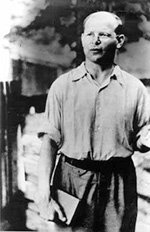The
Joy of Discipleship.
by Dietrich Bonhoeffer (1906-1945)
In times of church renewal Holy Scripture
naturally becomes richer in content for us.
Behind the daily catchwords and battle cries
needed in the Church Struggle, a more intense,
questioning search arises for the one who is our
sole concern, for Jesus himself.
What did Jesus want to say to us? What does he
want from us today? How does he help us to be
faithful Christians today? It is not ultimately
important to us what this or that church leader
wants. Rather, we want to know what Jesus wants.
When we go to hear a sermon, his own word is
what we want to hear. This matters to us not
only for our own sakes, but also for all those
who have become estranged from the church and
its message.
It is also our opinion that if Jesus himself
and Jesus alone with his word were among us in
our preaching, then quite a different set of
people would hear the word and quite a different
set of people would again turn away from it. It
is not as if our church’s preaching were no
longer God’s word, but there are so many
dissonant sounds, so many human, harsh laws, and
so many false hopes and consolations, which
still obscure the pure word of Jesus and make a
genuine decision more difficult.
We surely intend our preaching to be preaching
Christ alone. But it is not solely the fault of
others if they find our preaching harsh and
difficult because it is burdened with
formulations and concepts foreign to them. It is
simply not true that every word critical of our
preaching today can be taken as a rejection of
Christ or as anti-Christianity. Today there are
a great number of people who come to our
preaching, want to hear it, and then repeatedly
have to admit sadly that we have made it too
difficult for them to get to know Jesus.
Do we really want to deny being in community
with these people? They believe that it is not
the word of Jesus itself that they wish to
evade, but that too much of what comes between
them and Jesus is merely human, institutional,
or doctrinaire. Who among us would not instantly
know all the answers which could be given to
these people and with which we could easily
evade responsibility for them? But would an
answer not also demand that we ask whether we
ourselves get in the way of Jesus’ word by
depending perhaps too much on certain
formulations, or on a type of sermon intended
for its own time, place, and social structure?
Or by preaching too “dogmatically” and not
enough “for use in life”?1
Or by preferring to repeat certain ideas from
Scripture over and over and thus too heedlessly
passing over other important passages? Or by
preaching our own opinions and convictions too
much and Jesus Christ himself too little?
Nothing would contradict our own intention more
deeply and would be more ruinous for our
proclamation than if we burdened with difficult
human rules those who are weary and heavy laden,
whom Jesus calls unto himself.2 That would
drive them away from him again. How that would
mock the love of Jesus Christ in front of
Christians and heathen! But since general
questions and self-accusations do not help here,
let us be led back to Scripture, to the word and
call of Jesus Christ himself. Away from the
poverty and narrowness of our own convictions
and questions, here is where we seek the breadth
and riches which are bestowed on us in Jesus.
We desire to speak of the call to follow Jesus.
In doing so, are we burdening people with a new,
heavier yoke? Should even harder, more
inexorable rules be added to all the human rules
under which their souls and bodies groan? Should
our admonition to follow Jesus only prick their
uneasy and wounded consciences with an even
sharper sting? For this latest of innumerable
times in church history, should we make
impossible, tormenting, eccentric demands,
obedience to which would be the pious luxury of
the few? Would such demands have to be rejected
by people who work and worry about their daily
bread, their jobs, and their families, as the
most godless tempting of God?
Should the church be trying to erect a
spiritual reign of terror over people by
threatening earthly and eternal punishment on
its own authority and commanding everything a
person must believe and do to be saved? Should
the church’s word bring new tyranny and violent
abuse to human souls? It may be that some people
yearn for such servitude. But could the church
ever serve such a longing?
When Holy Scripture speaks of following Jesus,
it proclaims that people are free from all human
rules, from everything which pressures, burdens,
or causes worry and torment of conscience. In
following Jesus, people are released from the
hard yoke of their own laws to be under the
gentle yoke of Jesus Christ. Does this disparage
the seriousness of Jesus’ commandments? No.
Instead, only where Jesus’ entire commandment
and the call to unlimited discipleship remain
intact are persons fully free to enter into
Jesus’ community. Those who follow Jesus’
commandment entirely, who let Jesus’ yoke rest
on them without resistance, will find the
burdens they must bear to be light. In the
gentle pressure of this yoke they will receive
the strength to walk the right path without
becoming weary.3
Jesus’ commandment is harsh, inhumanly harsh for
someone who resists it. Jesus’ commandment is
gentle and not difficult for someone who
willingly accepts it. “His commandments are not
burdensome” (1 John 5:3). Jesus’ commandment has
nothing to do with forced spiritual cures. Jesus
demands nothing from us without giving us the
strength to comply. Jesus’ commandment never
wishes to destroy life, but rather to preserve,
strengthen, and heal life.
But the question still troubles us: What could
the call to follow Jesus mean today for the
worker, the businessman, the farmer, or the
soldier? Could it bring an intolerable dilemma
into the existence of persons working in the
world who are Christian? Is Christianity,
defined as following Jesus, a possibility for
too small a number of people? Does it imply a
rejection of the great masses of people and
contempt for the weak and poor? Does it thereby
deny the great mercy of Jesus Christ, who came
to the sinners and tax collectors,4 the poor
and weak, the misguided and despairing? What
should we say to that? Is it a few, or many, who
belong with Jesus?
Jesus died on the cross alone, abandoned by his
disciples. It was not two of his faithful
followers who hung beside him, but two
murderers. But they all stood beneath the cross:
enemies and the faithful, doubters and the
fearful, the scornful and the converted, and all
of them and their sin were included in this hour
in Jesus’ prayer for forgiveness. God’s merciful
love lives in the midst of its foes.5 It is the
same Jesus Christ who by grace calls us to
follow him and whose grace saves the thief on
the cross in his last hour.6
Discipleship is joy
Where will the call to discipleship lead those
who follow it? What decisions and painful
separations will it entail? We must take this
question to him who alone knows the answer. Only
Jesus Christ, who bids us follow him, knows
where the path will lead. But we know that it
will be a path full of mercy beyond measure.
Discipleship is joy.
Today it seems so difficult to walk with
certainty the narrow path of the church’s
decision7
and yet to remain wide open to Christ’s love for
all people, and in God’s patience, mercy, and
loving-kindness8
(Titus 3:4) for the weak and godless. Still,
both must remain together, or else we will
follow merely human paths. May God grant us joy
in all seriousness of discipleship, affirmation
of the sinners in all rejection of sin, and the
overpowering and winning word of the Gospel in
all defense against our enemies.
“Come to me, all who are weary and heavy laden,
and I will give you rest. Take my yoke upon you,
and learn from me; for I am gentle and humble in
heart, and you will find rest for your souls.
For my yoke is easy, and my burden is light”
(Matthew 11:28–30).
Excerpt
from the Introduction to Discipleship by
Dietrich Bonhoeffer, originally published in
German by Christian Kaiser Verlag in 1937.
Original, abridged English-language edition of
Nachfolge (Discipleship)
published in 1949 as The Cost of
Discipleship by SCM Press Ltd., London,
and the Macmillan Company, New York. Revised,
unabridged edition of The Cost of
Discipleship published in 1959 by SCM
Press Ltd., London, and the Macmillan Company,
New York. New English-language translation of
Nachfolge (Discipleship)
with new supplementary
material first published in 2001 by Fortress
Press, Minneapolis, as part of Dietrich
Bonhoeffer Works, Vol. 4. English
translation by Barbara Green and Reinhard
Krauss.
 Dietrich
Bonhoeffer (1906-1945) was a German Lutheran
pastor and a founding member of the
Confessing Church. He was the first of the
German theologians to speak out clearly
against the persecution of the Jews and the
evils of the Nazi ideology. In spring of
1935 Dietrich Bonhoeffer was called by the
Confessing Church in Germany to take charge
of an “illegal,” underground seminary at
Finkenwalde, Germany (now Poland). He served
as pastor, administrator, and teacher there
until the seminary was closed down by
Hitler's Gestapo in September,1937. Dietrich
Bonhoeffer (1906-1945) was a German Lutheran
pastor and a founding member of the
Confessing Church. He was the first of the
German theologians to speak out clearly
against the persecution of the Jews and the
evils of the Nazi ideology. In spring of
1935 Dietrich Bonhoeffer was called by the
Confessing Church in Germany to take charge
of an “illegal,” underground seminary at
Finkenwalde, Germany (now Poland). He served
as pastor, administrator, and teacher there
until the seminary was closed down by
Hitler's Gestapo in September,1937.
In the seminary at
Finkenwalde Bonhoeffer taught the importance
of shared life together as disciples of
Christ. He was convinced that the renewal of
the church would depend upon recovering the
biblical understanding of the communal
practices of Christian obedience and shared
life. This is where true formation of
discipleship could best flourish and mature.
Bonhoeffer’s teaching led
to the formation of a community house for
the seminarians to help them enter into and
learn the practical disciplines of the
Christian faith in community. In 1937
Bonhoeffer completed two books, Life
Together and The Cost of
Discipleship. They were first
published in German in 1939. Both books
encompass Bonhoeffer’s theological
understanding of what it means to live as a
Christian community in the Body of Christ.
He was arrested and
imprisoned by the Gestapo in April 1943. On
April 8, 1945 he was hanged as a traitor in
the Flossenburg concentration camp. As he
left his cell on his way to execution he
said to his companion, "This is the end –
but for me, the beginning of life."
photo of Bonhoeffer in the courtyard of
Tegel prison, summer 1944; source:
Christian Kaiser Verlag
|

